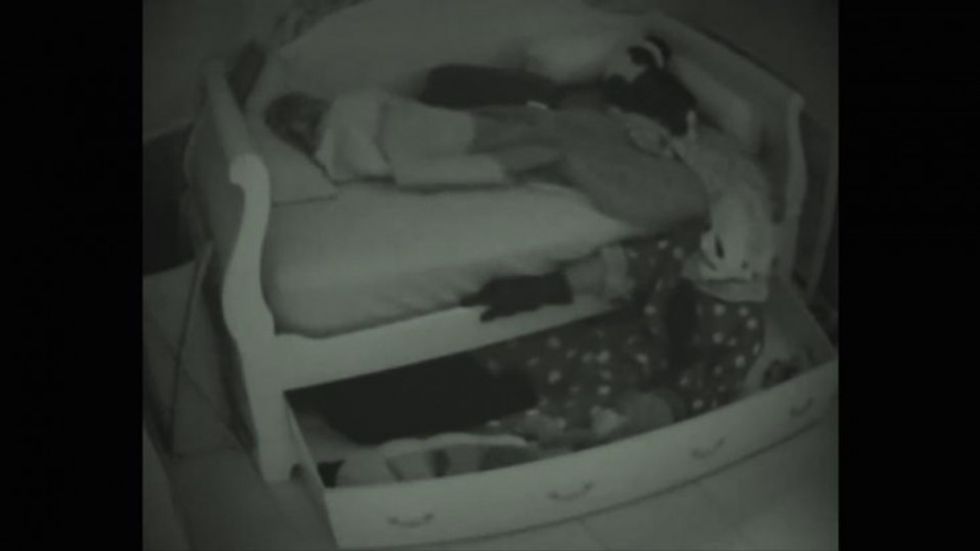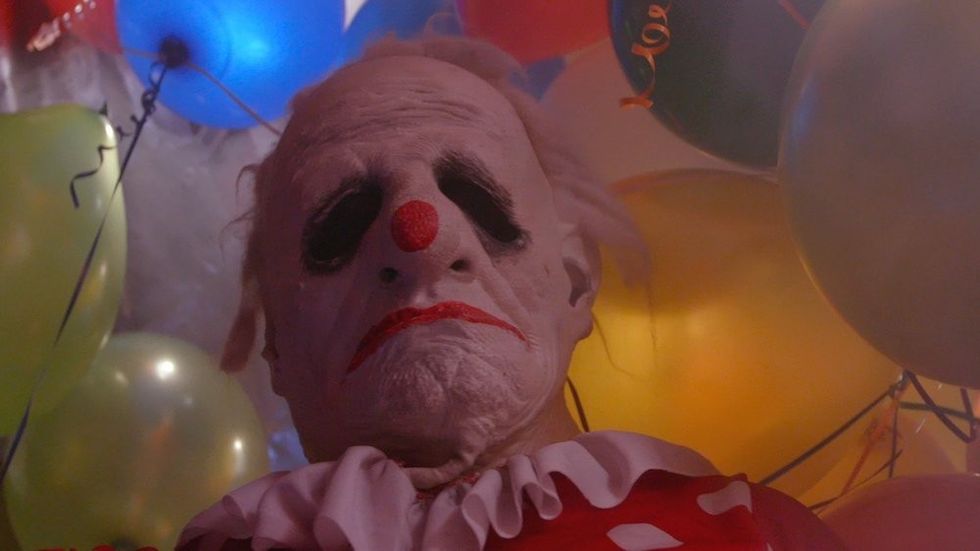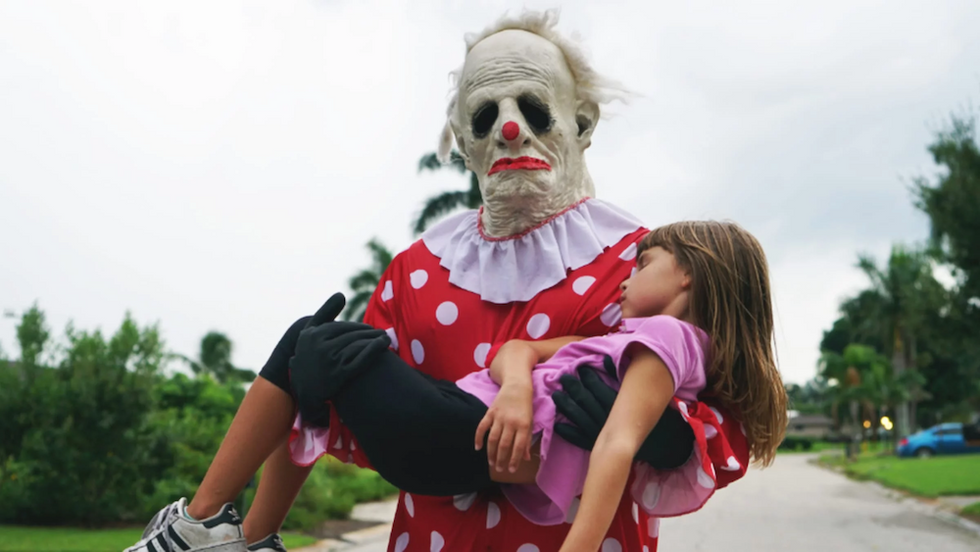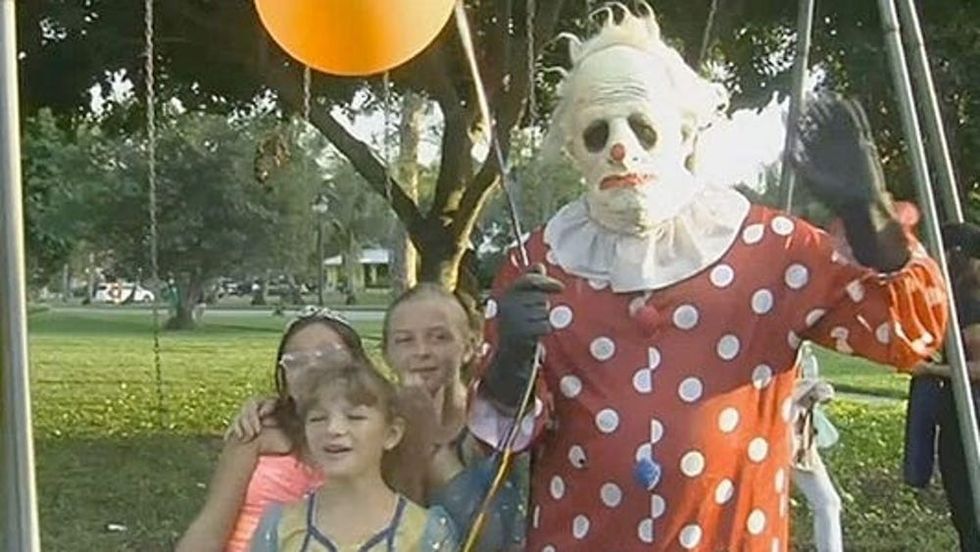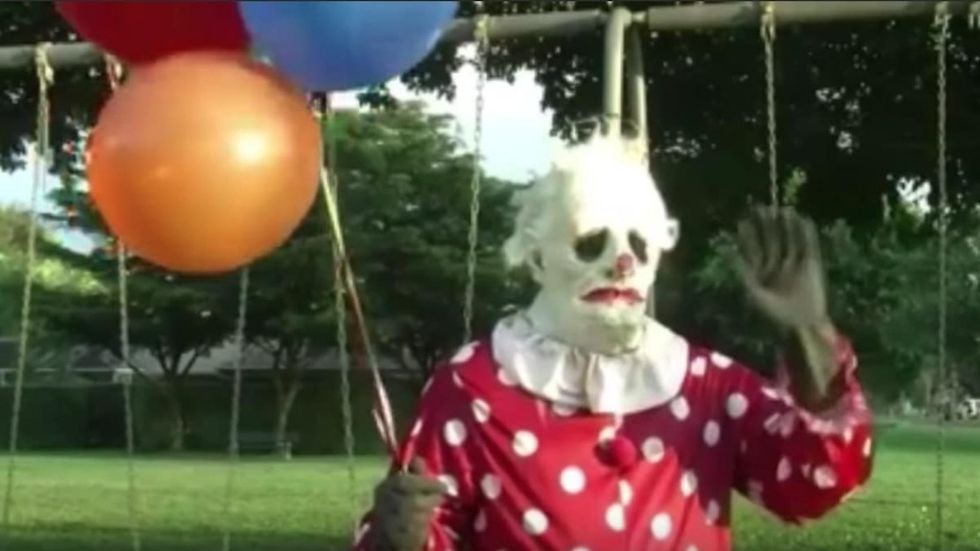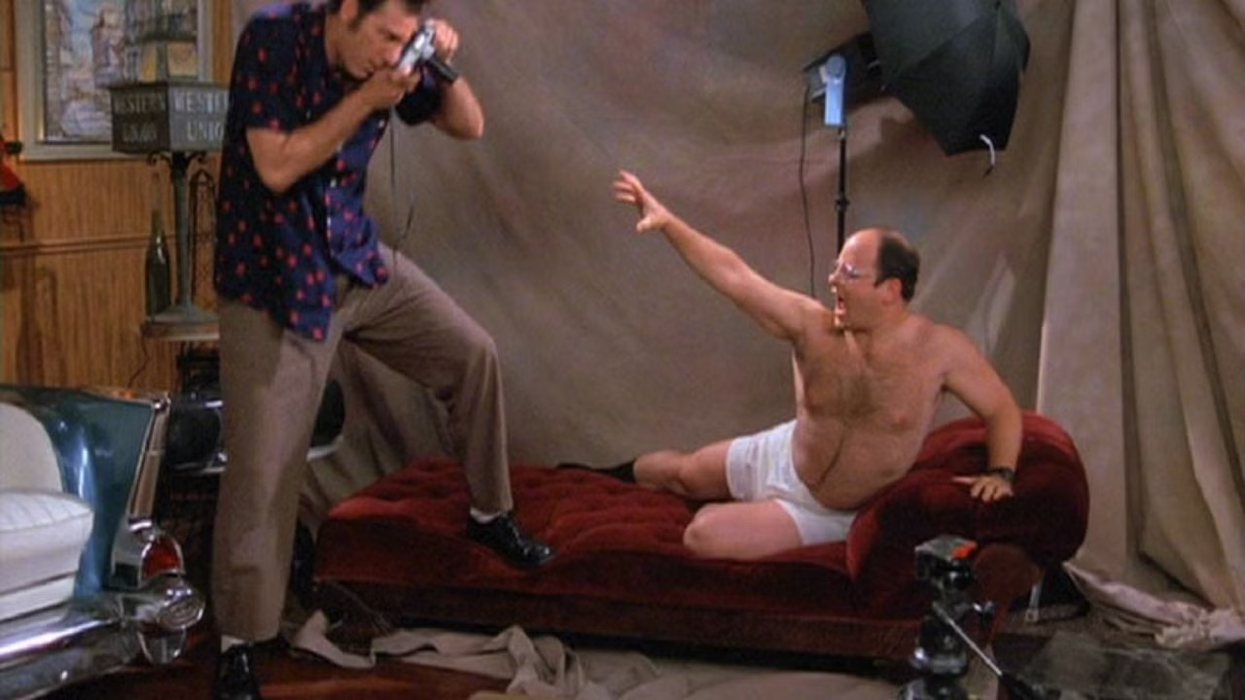Michael Beach Nichols Unmasks Wrinkles the Clown... or Does He?
The most important thing for Michael Beach Nichols was to tell the story honestly.
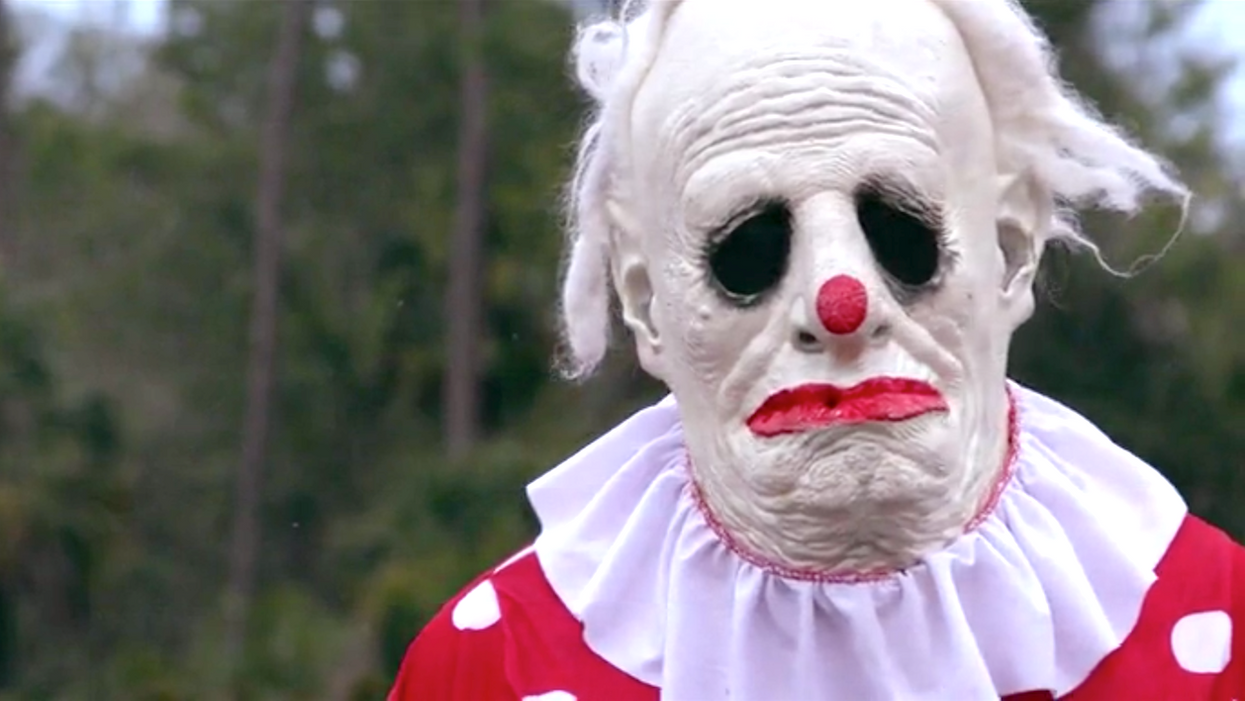
It would be easiest to say that the story of Wrinkles the Clown, the subject of Michael Beach Nichols’ new documentary, is actually a story wrapped in a rumor wrapped in a myth—with a real person at its true heart. The film describes the phenomenon of Wrinkles, a clown that Florida parents can call when they’re frustrated with their miscreant children to come to their houses and scare their children into obedience.
The idea is scary enough, having made its entrance by way of an ultra-creepy YouTube video of a clown crawling out from under a girl’s bed. What actually becomes truly frightening, as one watches the documentary, is the extent to which parents have embraced this method of scaring their children (the clown’s voicemail has 2-million-plus messages to date) and the seriousness with which some of the children take it.
Nichols has pieced together an appealing 360-degree view here, mixing interviews with parents, children, psychologists, and the actor who plays Wrinkles to present a narrative that, as do many stories of this type, also sheds light on the age in which it takes place.
No Film School talked with Nichols ahead of the film’s release about how the film got made.
No Film School: One immediate question I had was how you got access to the person who ostensibly plays Wrinkles.
Michael Beach Nichols: A friend sent me that really creepy video where Wrinkles is coming out from underneath the sleeping child's bed. I thought it was just so bizarre and so creepy and kind of funny. Shortly after that, I heard there was a Kickstarter campaign where a filmmaker was actually trying to make a documentary about Wrinkles the Clown. I donated to the Kickstarter campaign, and I actually reached out to the filmmaker, because, for my previous films, I've done several Kickstarters, and so I just wanted to offer any help that I could. Ultimately the campaign sort of went away. Then, six months later, my manager actually brought the project to me, and said, "Hey, are you interested in this? You know, they're looking for a director for this Wrinkles the Clown documentary." I was completely familiar with Wrinkles, obviously, and the filmmaker who had been trying to make the documentary trusted me and basically made the introduction to Wrinkles.
NFS: Now, was the person playing Wrinkles responsive to the idea of a documentary, or was there any pushback from him?
Nichols: Certainly, for him, it was of utmost importance that he stays anonymous. That was the number one thing. And we were completely fine with that. We recognized that the power of the story comes, to this day, from the fact that no one knows who's behind the mask. But he was a little bit hesitant to show that there is someone who isn't the 65-year-old man behind the mask. So that was the conversation, and we sort of had to push for why we thought it was a more interesting story, and also why the only way that we really felt comfortable with it being a documentary is that we actually show you what's behind the myth.
Because if we had made the entire film, and it was just about the 65-year-old man, it wouldn't be a documentary. I mean, we would be sort of propagating the myth of Wrinkles. So for us it became about showing the myth of Wrinkles that exists online, the myths that people have bought into and created with these amazing voicemails. And then we show how the person behind the mask created this and how digital folklore, in real-time, is crafted and takes on a life of its own once it's online.
"We recognized that the power of the story comes, to this day, from the fact that no one knows who's behind the mask."
NFS: I would think that as the filmmaker it would be very hard to maintain objectivity about the subject. I wonder how you, as you were working through the idea for the film and developing a script for it or a structure for it, developed objectivity about the subject, because clowns on their own have a tolerable, kind of creepy sort of feeling to them, but then there's also the issue of scaring children and at what point this becomes abusive behavior.
Nichols: I feel like I'm able to be fairly objective in that I don't have to agree at all with my subject. As long as I'm telling the truth and letting that person speak their truth, that's interesting. People are strange and different and their views aren't always going to align with yours. The less interesting documentaries to me are ones where you know the filmmaker's perspective, from the very first five minutes. It can feel like they're laying out a thesis on what happened instead of trying to tell a story. My previous film, Welcome to Leith, was about white supremacists. Obviously I do not have any sympathy for their viewpoints, but those viewpoints existed, and they led to their trying to take over this town.
While you could make the argument that I gave him a platform, I could make the argument that I was pulling away the rock and showing what was underneath it, exposing it to daylight. So I feel very confident in my approach of letting people speak and showing that there were things that happened because of what they’d done. That's just all part of the story.
NFS: When you were assembling all these different snippets and pieces of dialogue and you're consulting with psychologists and doing all these things to try to make it a multisided view, how much material did you assemble, versus the material that made it into the film?
Nichols: There were definitely way more voicemails than we could ever include, but for us it was important to pick out the themes we saw recurring over and over again. And so we basically just started to classify the type of calls that Wrinkles would receive. We definitely found trends. So to us, it was just important to give a sense of the wide variety of responses to Wrinkles, which could either be super negative, super positive, or just really playful. It was definitely a very difficult process.
One of the more challenging things was figuring out how to deal with the parent who used the phone number to scare his very young daughter. We knew we wanted to give him, the opportunity to speak, because we had talked to a child psychologist who had straight-up called it child abuse if it's done frequently and the child is actually scared by it. We didn't want to just throw him under, so we told him we talked to the child psychologist, who thinks it could be viewed as child abuse. His response was, "No, I don't agree. I think it's just a technique. I don't think it's child abuse. Child abuse is when you hit your child."
It’s interesting because Wrinkles, himself thinks those types of calls are really disturbing. He didn't actually ever think someone would think that you would hire him for that. He couldn’t believe parents were doing this, because to him it is really not healthy. So, we wanted to present the information and give the parent an opportunity to respond to it. But I think it's really just a case by case thing. If I was a kid and my parents had done that to me, I think I would have kind of liked it. I would've thought it was something really interesting because I liked being scared as a kid. But then there are other kids who, as you can tell from the voicemail, were not okay with it, and obviously those are situations where you should not do that. So I think that parents should know their kids, and if the kid is going to have a meltdown while you're calling, that's not okay.
"He was basically becoming the character that kids in these voicemails thought he was. He was basically becoming someone based on other people's ideas of him."
NFS: One thing I was thinking when I was watching the film is that it would be a very tricky film to organize and just sort of script out. How much did your working script change as you were going along? How much did it mutate as you were progressing through the film?
Nichols: I mean we basically had the situations, insofar as having the person that was portraying Wrinkles in this van, going to the strip club, going to the beach, going fishing, cooking. We never really knew what Wrinkles himself would say in these little interviews we did with him in each spot. So, in terms of the actual content of the interviews, all of that was a real interview. We wanted to ask him these questions, but of course, he's playing a character and he's answering these questions in character as Wrinkles. So, sort of depending on what he said, that would obviously inform and would potentially sometimes change the next thing that we would film with him.
We also sort of knew what the myth of Wrinkles was that was existing online, insofar as he lives in his van, drinking a lot. He's kind of broke. He's just trying to have a good time. So we sort of knew the bare bones of what the myth would be and how we wanted to capture that. And then all the details that came out of those interviews. That was the thing that we didn't really control.
NFS: Did the person playing Wrinkles break character at all?
Nichols: Oh absolutely. He would definitely break character. He had created this character, but he hadn't fleshed him out. He basically had this voicemail that he had left and he did the voice from that voicemail. He had done one interview with the local news station that went viral in the very beginning, but that was really it. He hadn't had a lot of experience in playing this character in the sort of fleshed-out way that we wanted to do for the film. So, I think that was sort of challenging for him because he was basically becoming the character that kids in these voicemails thought he was. He was basically becoming someone based on other people's ideas of him.
NFS: Why is it that this particular phenomenon is happening right now? What is it about today's society or online culture that's causing this sort of success?
Nichols: I think one reason why it really took off is that there was a working phone number. So people felt like they could call this number and verify the existence of someone answering on the other end. Whether that person was Wrinkles the Clown or not, or someone else, it didn't really matter. It was just this tangible thing you could do. There was sort of a next step that you could take. You could see a video, you could see his face, and then you could call him and maybe he would answer.
I also just think the fact that he is anonymous allows other people to project their fears or insecurities or aggression onto this anonymous person who became a blank canvas. At this point, there are almost 2 million messages that have been left for him. That set him apart from the rest of this creepy clown hysteria. Those clowns just go into the ether. There's nothing else you can do with them. You don't even necessarily know if they have a name. But Wrinkles has a name, he has a phone number, and he's a voice.
